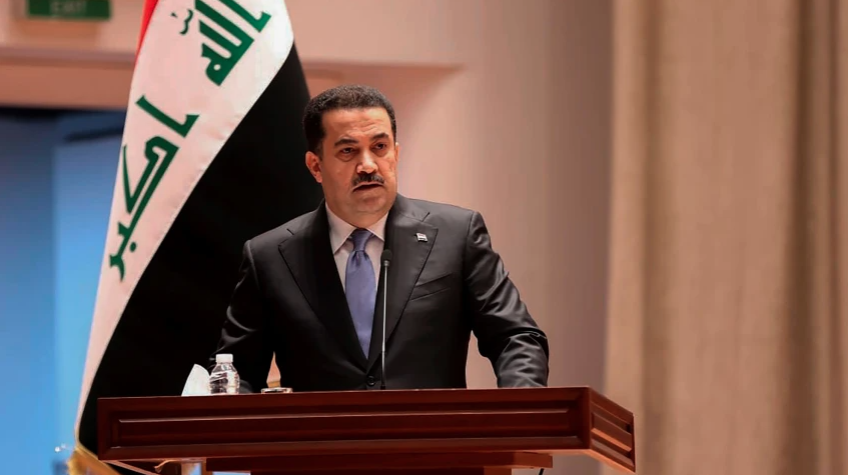The new government in Baghdad has nevertheless been welcomed by Iraq’s international partners, including the U.S., the U.K., the United Nations and Saudi Arabia. But despite last week’s breakthrough, which put an end to months of political infighting that paralyzed governance in the country, the composition of Iraq’s new government and the broader context within which it will be forced to operate suggest that Iraq’s deep-seated challenges have not abated.
Unlike its predecessor government, there are no ministers from the Sadrist movement in the new Cabinet. After winning the single largest number of seats in last year’s parliamentary elections, albeit shy of a majority, Muqtada al-Sadr’s movement aimed to install a Cabinet dominated by its members and allies. But his effort to do so was blocked by his political opponents, who sought to maintain the practice of power-sharing along sectarian lines, known as the muhasasa system.
The new Cabinet is also devoid of the independent parliamentarians representing the October 2019 reform movement. In fact, two of them—Alaa al-Rukabi and Falah al-Hilali—were physically attacked by Coordination Framework members after they refused to vote for al-Sudani’s government in the vote of confidence.
Some of those independent lawmakers, as well as Saudi media like al-Arabiya and Asharq al-Awsat, have been quick to note that two prominent ministers in the newly inaugurated Cabinet are directly affiliated with Iran-backed militias. Ahmed al-Asadi, the minister of labor and social affairs, is also the secretary-general of Jund al-Imam, which is part of the Popular Mobilization Units, a state-sanctioned grouping of Shiite militias for which Al-Asadi previously served as spokesperson.
Meanwhile, Naim al-Aboudi, the minister of education and scientific research, is a member of the Sadiqoun parliamentary bloc, which represents Asaib Ahl al-Haq, a group led by Qais al-Khazali that Washington has designated as a terrorist organization. The two ministers also belong to the Fateh political alliance led by Hadi al-Amiri, the secretary-general of the Badr Organization, a Tehran-backed Shiite Islamist political party and military organization.
Al-Sudani has tried to assuage U.S. and Saudi concerns about his ties to Iran by pledging to pursue a policy of “friendship and cooperation with all.” But those assurances failed to persuade many October 2019 reformers, who took to the streets in Baghdad to protest al-Sudani’s Cabinet because of its pro-Iran tilt and their own exclusion. Though the protests were limited in scale and duration, they nonetheless signal a disconnect between the government in Baghdad and large segments of the Iraqi population.
Al-Sudani also promised that he would not “allow Iraq to be a base for attacks on other countries.” But with the new Cabinet dominated by the same Iran-backed political elites who have played prominent roles in Iraqi politics since the U.S.-led military invasion that overthrew Saddam Hussein in 2003, it is unlikely that the government will seek to reduce Tehran’s influence and involvement in Iraqi affairs—or be able to.
The new government faces the same dilemma that the previous Cabinet was unable to overcome, namely that Iraq’s power-sharing muhasasa system scarcely represents the full spectrum of political voices in the country. Shortly after gaining parliamentary approval for his Cabinet, al-Sudani announced a pledge to amend the electoral law, including measures to curb fraud in the vote counting, within three months of taking office and hold parliamentary elections next year, seemingly extending an olive branch to both the Sadrists and the October 2019 independents. But both promises sound ambitious.
In the meantime, it is unclear how Baghdad will be able to address the myriad economic, environmental and administrative challenges faced by the Iraqi state, especially the stubbornly high youth unemployment rate and the systemic corruption that plagues governance. Less than two weeks before the new Cabinet was approved by parliament, former Finance Minister Adel Abdul Jabbar made the startling revelation that, while in office, he had uncovered an embezzlement scheme that had looted $2.5 billion from the General Tax Authority.
The new government has pledged to tackle corruption, saying that anti-graft reforms are high on its agenda. But there is a risk that the associated investigations could also be used as a means of persecuting the state’s political opponents under the guise of fighting corruption.
As the new Cabinet gets down to the business of grappling with the immense challenges that lie ahead, it is likely that the makeup of the government will resemble a game of musical chairs, in which government ministers frequently change seats, reflecting the ongoing competition among Iraq’s political elites for power and resources within and outside the structure of formal politics.
Source (Click Here)


 RSS Feed
RSS Feed